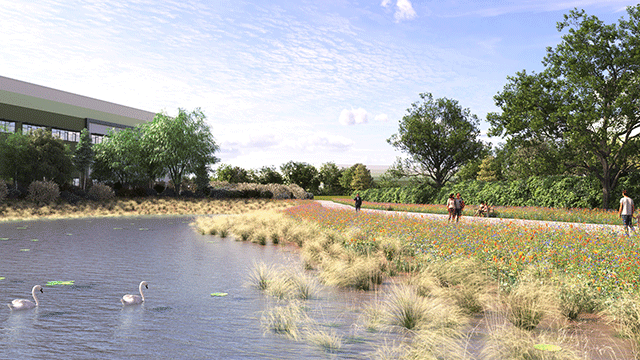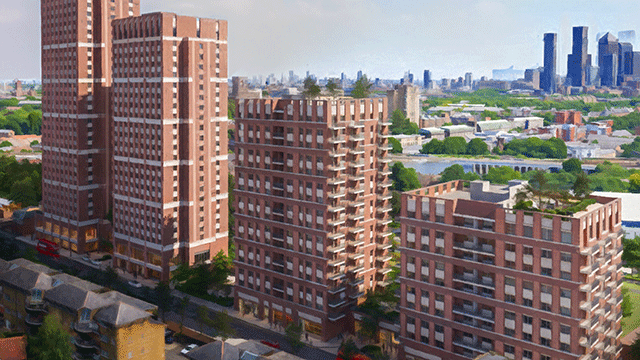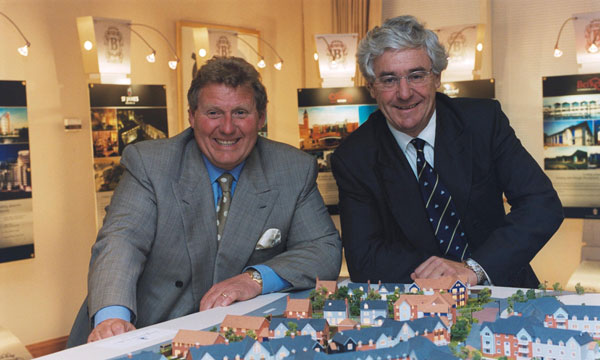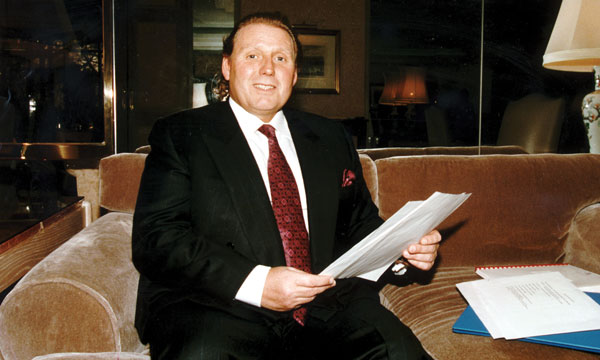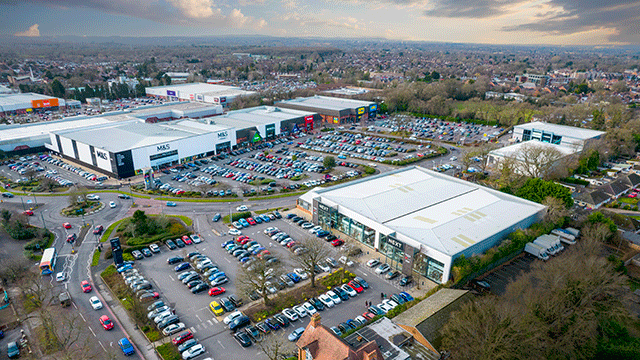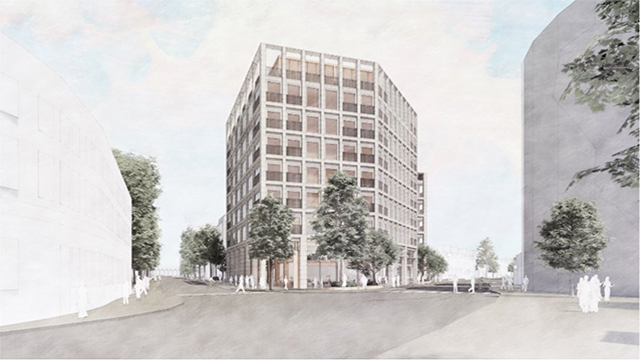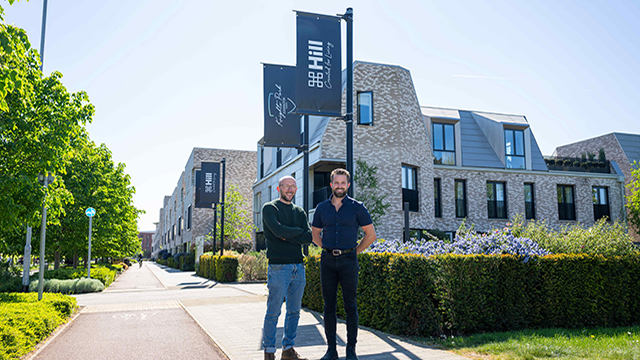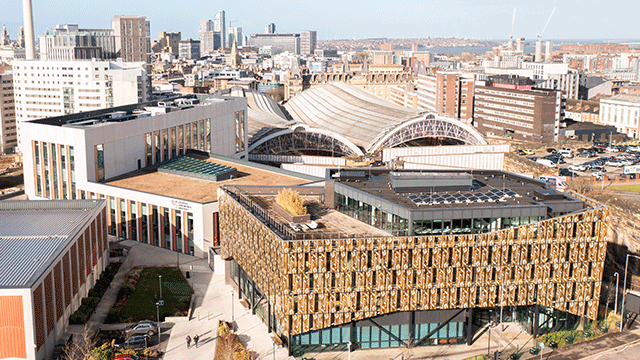“Good development is all about people. It’s about making life better, creating beautiful homes and putting the wellbeing of the whole community at the heart of every plan. It’s about creating places that people will love as their own and care for long after we’ve all gone.”
In his own words, that is what really mattered to Tony Pidgley. In Waheed Nazir’s Regenerating Cities in 2019, he said “at the end of the day it comes down to people’s quality of life – how they see it rather than us developers or politicians”.
Pidgley died last week, on 26 June, aged 72. He is remembered as a true character, a builder who knew a site inside out, and a shrewd businessman, a bellwether for the market.
Tributes flooding in from the industry note his sense of humour and incredible work ethic, but also the legacy he left in the homes and communities that survive him, and the business he created at Berkeley Homes.
His long-time friend and close colleague Rob Perrins, chief executive of Berkeley Homes, said: “Tony was a brilliant man who I have been fortunate to work closely with for 20 years. He started Berkeley by building one house and his vision grew into a FTSE 100 company. He knew he would never retire so he ensured that his culture was embedded in the company for when this sad day came.”
Anthony William Pidgley was born in 1947. He was adopted from Barnardo’s by a travelling family who lived in a caravan. He left school aged 15 and launched his first business, a haulage and plant firm which he sold to Crest Homes (later renamed Crest Nicholson), joining as building director.
There he met Jim Farrer and in 1976 the pair left to start Berkeley Homes, which later became Berkeley Group. The business began as a high-end housebuilder in Surrey and built four homes in its first year with a turnover of £121,000. It grew to a listed, national company with a market capitalisation of £5.2bn.
Pidgley achieved this through smart acquisitions and joint ventures. His drive was unwavering. Surrounded by loyal colleagues, including Rob Perrins, Karl Whiteman, Paul Vallone and Sean Ellis, he created a legacy for regeneration.
‘A true legend’
Fellow developer and rival, Stephen Conway, founder and executive chairman of Galliard Homes, describes Pidgley as “a true legend of our industry, a good friend who loved Berkeley”. He adds: “No man ever had a work ethic like Pidge.”
“He was wise, straight and had a genuine sense of values,” says Gerald Ronson. “He was the doyen of the residential property business, he was the guv’nor of that business. He had the vision, the ability, the work, the drive.”
Ronson knew Pidgley for more than 30 years and considered him a friend, although they never worked together. The pair and their wives would meet regularly for breakfast, lunch or supper and shared the same passion for their business. They competed with one another over who got up the earliest to visit their vast portfolios. Pidgley at 5am, Ronson at 6am.
“They don’t make guys like that any more,” adds Ronson. “He knew his business inside out. He knew what he was doing, he knew where he was going and he wasn’t planning on departing at such a young age.”
Ronson, 81, says Pidgley was a true developer, part of what increasingly seems a distant period in real estate. “There’s not a lot of us left from that era,” he says, adding: “He was a special man who will be sadly missed.”
In more than 50 years in the residential industry, Pidgley built relationships across the private and public sector.
Nick Walkley, chief executive of Homes England remembers Pidgley’s fierce negotiations: “It’s not tough but fair, it’s actually that he knew that everybody had an interest and we needed to represent it.”
Pidgley was in and out of Homes England as the housebuilder grew in scale, working on deals and in one instance advising junior staff on their careers. “He was totally candid about the housing market and was just open to sharing what he knew in a pretty selfless and humble way,” says Walkley.
“It was just hugely impressive and people came away really gobsmacked. They would then comment when they were out and about, on site or at events, Tony would always remember them and say hello.”
“He had a genius for matching his legendary commercial acumen with a unique ability to connect across all walks of life and it was this, coupled with his love for London, which always powered his passion for regeneration,” says David Lunts, executive director for housing and land at the Greater London Authority.
“Not since the days of Thomas Cubitt has any housebuilder done more to change the face of London, and his legacy will be huge and enduring.”
‘A sixth sense’
“He was a mate and mentor, blessed above all with an innate sixth sense that no business school could begin to teach,” says Nigel Hugill, chief executive of Urban&Civic. “His capacity for extraordinary judgments stands without equal in an industry to which he has given so much.”
In 2005, Hugill and partner Robin Butler wanted to buy the Berkeley subsidiary, Crosby Homes. “I sat with Tony, explained we did not have the money, but could only raise the then not inconsiderable sum of £250m against an exclusive contract.
“A contract was duly delivered to my home the next day, addressed to me personally,” says Hugill.
That acquisition formed the basis of the business with Lendlease, which went on to build the Athlete’s Village for the 2012 Olympics.
“He was one of life’s great enhancers. He was an uplifting person to be with, he was desperately energetic, hardworking and whip smart,” says Jackie Sadek, chief operating officer at UK Regeneration.
“It was all the life enhancing stuff, the humour, the generosity; that was what made him special.”
Sadek cackles with laughter as she recalls stories of “the Pidge”. One year at MIPIM when she was chief executive for the Royal Partnership, Pidgley chased her around the tables, begging to buy a slice of the 700-acre West London industrial site.
“Eventually, to shut him up, I said, ‘Alright, come and have a site visit and I’ll show you around’. He goes, ‘I’ll pick you up in my car at Park Royal tube station at 8am’. I had to get up at some ungodly hour and go out and meet Tony. Of course, he’d already done two hours of work in the back of the car,” she says. The site tour led to a month’s long email tennis (always dictated to his PA, Joanne Potton) with the subject “Hands off my sheds”.
“He kept saying ‘but it’s soulless’. He was bloody right, it was soulless, but it was soulless for a reason,” says Sadek, pointing out the importance of that industry for London.
That convergence of “sheds and beds” saw the Berkeley chief ultimately working closer with SEGRO. Chief executive, David Sleath, says: “Warm, straightforward and utterly reliable, Tony was a pleasure to deal with, a man true to his word. I instantly knew that a handshake with Tony was a commitment to which he wouldn’t waiver.”
‘Life-changing’ homes
Sadek’s final correspondence with Pidgley came in March, when a meeting over community ownership models was cancelled as the country went into lockdown. Pidgley had requested the meeting as a new convert following a visit to the Walterton and Elgin community housing scheme.
“This is a hard-bitten housebuilder who started off life with a haulage company. That is a real road to Damascus. He really came round to that, he felt it viscerally, that business about the community,” says Sadek. “It was Kidbrooke really. He formed a fantastic relationship with some of the community there and he began to understand the value of putting community at the heart.”
Berkeley’s £1bn regeneration at Kidbrooke Village is still under development, with some 5,000 homes, retail, community and leisure facilities on the site of the former Ferrier Estate in Greenwich.
John Walker, former planning director for Westminster City Council, like many, was treated to a tour of Kidbrooke with Pidgley. He has several memories of the site, from a furore over a wall socket that Pidgley spotted had not been moved a year after the original request, to a more touching encounter at a planning meeting.
“I recall a planning conference where a resident from Kidbrooke got up and described how her life was a mess with ‘no hope’ living in squalid conditions,” he says. “She then visited a mock-up of the housing development and said, ‘That is all very nice Mr Pidgley, but where is the affordable housing?’ Tony replied, ‘This is the affordable housing and I am building it first’.
“She was so excited she dashed off and dragged her son out of school to show him the new home they would be living in. She described the regeneration as ‘life changing’ and personally thanked Tony at the conference. And that is what Tony took great pleasure in: changing people’s lives for the better.”
‘Our most important recruit was Tony’
There was always a project that required a call to the Pidge, writes EG editor-in-chief Damian Wild. In 2011, following riots that spread from London to other English cities, Jackie Sadek and I cooked up the idea of a Regeneration Commission that would draw up an action plan to bring together private money and public assets and deliver targeted urban renewal. I won’t pretend it changed the world. But I’m sure I won’t upset other members when I say our first, and most important, recruit was Tony.
There were plenty of similar situations that required similar calls over the intervening years. But fast forward to last autumn, on stage at U+I’s HQ for the launch of Regenerating Cities, the book by Birmingham City Council’s former economy director Waheed Nazir. On stage, a panel of regeneration royalty: Nazir himself, Manchester’s Sir Howard Bernstein, The Crown’s Dame Alison Nimmo, L&G’s Bill Hughes, Benson Elliot’s Marc Mogull – even the PM’s number two, Sir Ed Lister, had stepped away from Brexit negotiations to be there, his phone buzzing away.
Oh, and Pidgley too, prodding, poking and galvanising his fellow panellists to do more on regeneration and faster. As he always did, he took issue with my chairing too, light-heartedly and probably correctly.
Each of the speakers had contributed to the book. When I had asked Nazir in the run-up which chapter EG should extract he was too polite to pick a favourite. I felt less restrained and said on stage that Pidgley’s was mine as you could hear his voice come through loud and clear. I’m not sure he took it as the compliment I had intended. He was joking, I think.
Afterwards we arranged a tour of Kidbrooke Village, built by Berkeley Group on the site of the Ferrier Estate in Greenwich. It was a transformation of which Pidgley had been rightly proud. He had been badgering me to go for a few years and I was pleased to be able to tell him I had, one recent Sunday morning, but that I would rather see it with him.
We arranged a date, had to re-arrange, and sadly it won’t now happen.
To send feedback, e-mail emma.rosser@egi.co.uk or tweet @EmmaARosser or @estatesgazette




